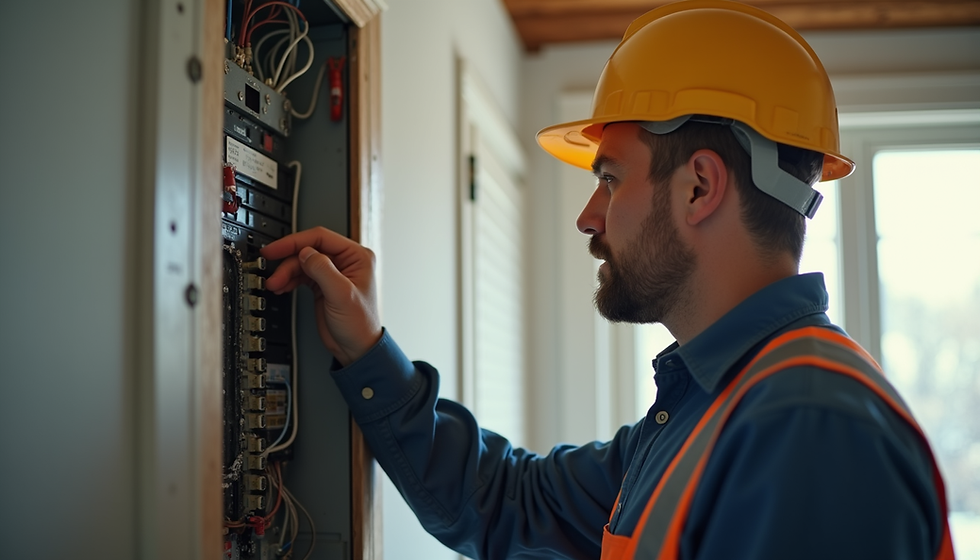What Home Inspection Services Cover
- David Lee
- Sep 8, 2025
- 3 min read
When buying or selling a property, understanding the condition of the home is crucial. Detailed property inspections provide a comprehensive evaluation of a house’s structure and systems. These inspections help uncover hidden issues, ensuring informed decisions and peace of mind. This article explores what home inspection services cover, breaking down the key components and what you can expect from a thorough inspection.
Understanding Detailed Property Inspections
Detailed property inspections are more than just a quick walkthrough. They involve a systematic examination of a home’s major components, identifying potential problems that could affect safety, functionality, or value. Inspectors use specialized tools and their expertise to assess everything from the foundation to the roof.
A typical inspection includes:
Structural integrity checks
Electrical system evaluation
Plumbing system review
HVAC (heating, ventilation, and air conditioning) assessment
Roof and attic inspection
Interior and exterior condition analysis
These inspections provide a detailed report with photos and recommendations, helping buyers negotiate repairs or price adjustments and sellers prepare their home for the market.

Key Areas Covered in Detailed Property Inspections
Structural Components
The foundation, walls, floors, ceilings, and roof framing are inspected for cracks, water damage, or signs of settling. Inspectors look for:
Foundation cracks or shifts
Sagging or uneven floors
Wall cracks or bulges
Roof truss or rafter damage
Identifying structural issues early can save thousands in costly repairs and prevent safety hazards.
Roofing and Gutters
The roof is a critical part of the home’s protection against weather. Inspectors check for:
Missing or damaged shingles
Signs of leaks or water damage
Proper installation and condition of flashing
Functionality of gutters and downspouts
A well-maintained roof extends the life of the home and prevents interior damage.
Electrical Systems
Electrical inspections focus on safety and code compliance. Inspectors examine:
Service panels and breakers
Wiring condition and connections
Outlets and switches
Grounding and bonding
Faulty wiring or outdated systems can pose fire risks and may require upgrades.

Plumbing Systems
Plumbing inspections cover water supply and drainage systems. Key points include:
Pipe condition and leaks
Water heater functionality
Drainage and sewer lines
Fixtures and faucets
Detecting leaks or corrosion early helps avoid water damage and costly repairs.
Heating, Ventilation, and Air Conditioning (HVAC)
Inspectors assess HVAC systems for efficiency and safety by checking:
Furnace and air conditioning units
Ductwork condition
Thermostat operation
Ventilation and exhaust systems
Proper HVAC function ensures comfort and energy efficiency.
Interior and Exterior Inspections
Interior Components
Inside the home, inspectors evaluate:
Walls, ceilings, and floors for damage or stains
Doors and windows for proper operation and sealing
Kitchen appliances and cabinetry
Bathrooms for leaks and ventilation
These checks ensure the home is livable and free from hidden defects.
Exterior Components
The home’s exterior is examined for:
Siding or brick condition
Driveways and walkways
Decks, porches, and balconies
Landscaping and drainage
Proper exterior maintenance protects the home from weather and enhances curb appeal.

Why Detailed Property Inspections Matter
A detailed property inspection is an essential step in the real estate process. It provides:
Transparency: Buyers know exactly what they are purchasing.
Negotiation leverage: Identified issues can be addressed before closing.
Safety assurance: Potential hazards are uncovered and mitigated.
Maintenance planning: Homeowners receive guidance on upkeep and repairs.
For anyone involved in a property transaction, investing in professional home inspection services is a smart decision that protects financial and personal interests.
Preparing for Your Home Inspection
To get the most out of a detailed property inspection, consider these tips:
Be present during the inspection: This allows you to ask questions and see issues firsthand.
Provide access to all areas: Ensure the inspector can check basements, attics, crawl spaces, and utility rooms.
Review the inspection report carefully: Look for photos, descriptions, and recommendations.
Follow up on major concerns: Consult specialists if needed for repairs or further evaluation.
Being proactive helps you make informed decisions and plan for future maintenance.
Final Thoughts on Detailed Property Inspections
Detailed property inspections are a vital tool for understanding a home’s condition. They cover every major system and component, providing a clear picture of what to expect. Whether buying or selling, these inspections help avoid surprises and ensure a smooth transaction.
Investing in professional inspections is an investment in your peace of mind and the long-term value of your property. Take advantage of expert services to protect your home and your future.





Comments